Professionals in their mid or senior level often find themselves conflicted with the idea of making another career change. Can they still make the cut for promotions and if so can they handle the promotion at the stage of their professional track? Susan Peppercorn is an example of multiple career changes and she helps people figure out the next best step for their career. Growing up with French Canadian parents, Dr. Saida Désilets has a very relaxed perspective about the body and sensuality. As the world’s leading authority in the Jade Egg Practice, she believes that the impact of our beliefs and thoughts lead to creating richer lives. She shares that fulfillment is not an end result, but rather it is a state of being.
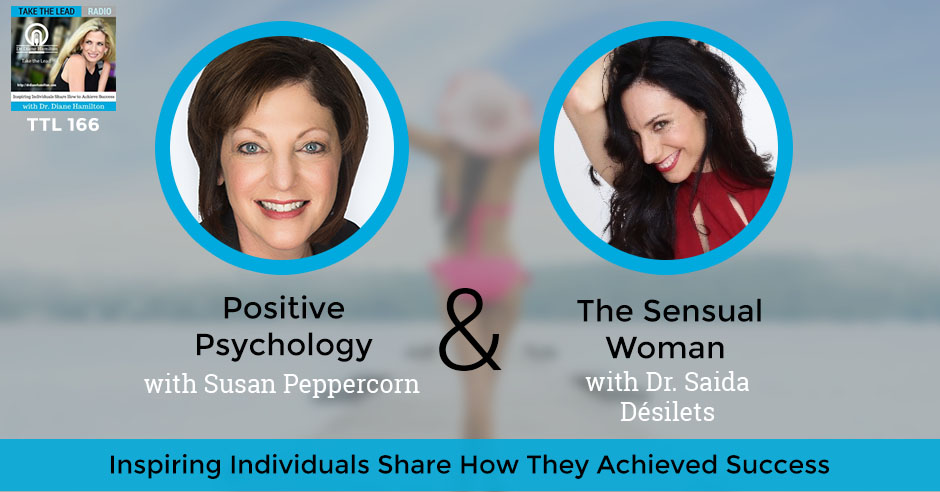
We have Susan Peppercorn and Saida Désilets. We’ve got two really high-powered women here who have done some amazing research, and they’re going to share what they know.
Listen to the podcast here
Positive Psychology with Susan Peppercorn
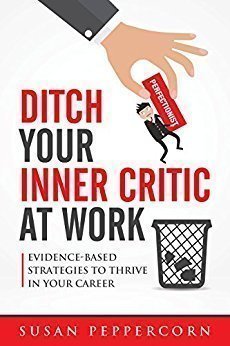
Ditch Your Inner Critic At Work: Evidence-Based Strategies To Thrive In Your Career
I am here with Susan Peppercorn, who helps mid and senior level professionals find their next best career step, promotion, new job career or entrepreneurial option. She is frequently quoted in the New York Times and the Wall Street Journal, Fast Company, US News, Harvard Business Review, and US World Report. These are some of the publications that have gone to her for career advice. She is a certified Positive Psychology Coach and was a teaching assistant for Tal Ben-Shahar, who taught the most popular course at Harvard University and started the certification in positive psychology. Accredited by the International Coaching Federation, she’s an Executive Mentor for the Boston chapter of the Healthcare Businesswomen’s Association, HBA. She’s the bestselling author of Ditch Your Inner Critic at Work: Evidence-Based Strategies To Thrive in your Career. It’s so nice to have you here.
Thank you so much. It’s a pleasure to be here.
It would be nice to get a little background on how you got to this point in your career. Can you give us a little bit of your history?
This is my fourth career. For anyone who wants to know whether it’s possible to make multiple career changes, it is. Not that I would always advise as many as I’ve made. I started out as a musician. I realized that I was not at the top of the game and was going to starve very quickly unless I switch to something else. The bulk of my career was in high tech sales and marketing, where I was very fortunate to learn a lot about the industry and a lot about how companies work. I never loved high tech. It served its purpose. It paid me well. The company that I was with was acquired and I was able to leave the company with a severance package. I had to decide what I wanted to do. I took a few interim steps and one of them landed me working for the career center in a business school at Boston University. I would informally coach the MBA students there and help them prepare for interviews. It’s then that the light bulb went on that said, “This is what I need to be doing.”My career has been somewhat circuitous, but I would say the thing that ties all of the different aspects of it together is that I love people. I love their stories and I love helping them.
I’m curious what your experience was like at that Harvard course. Tell me a little about that certification in positive psychology
Six years ago, Tal Ben-Shahar had been on the faculty at Harvard University. He decided that he was not going to pursue the academic path, which is about publishing and pursuing academic credentials. He already had that. His goal and his vision were to take the learnings and the research that’s done in the ivory tower as he calls it and bring it to main street. That’s what he did with the certification program. He developed the program. He recruited some top resources to help him build out this program. It’s been given around the world. His vision was to take this academic research that very few people know about and bring it to the masses. When he was at Harvard in the early 2000s, he taught what was then the most popular course ever offered to undergraduates, and it was a course in positive psychology.
What do you think about certifications? Do you think that we’ll see more of that and less of the degree programs as we move along and younger generations take over? Do you think that we’ll have formal education or is it going to become more compartmentalized?
There’s a place for both and there’s definitely a place for degree programs. It depends upon the time and the rigor that someone wants to put into it. The interesting thing about this program is, when I look back on it and I’ve talked to other graduates, it was very rigorous, considering that it’s a certification program. The amount of reading that we had to do that also involved doing the project was quite extensive. I don’t think it replaces degree programs. I’m the first to tell people, “I am not a psychologist. I don’t have a PhD.” What this program did help me do was take the research and learn how to apply it in my own coaching practice. After I finished this program, I went on to get two additional certifications. One is specifically in positive psychology coaching and then as a coaching certification from the International Coaching Federation. Credentials, not the credential per se, but it’s important to learn and know whatever the field that you’re in, to know what you’re talking about. With my clients, their lives, in some respect, are in my hands. They are expecting certain outcomes when they work with me. That’s a lot of responsibility. If I didn’t have the training I had, I would not feel comfortable doing the work that I do.
You use that to write about your inner critic at work. We all have one. I like how you say, “Stop allowing critics to rent space in your head.” I’m writing about a curiosity and I think fear is one of the things that hold us back from being curious. I’m curious to hear your input on where you think it all falls together with fear and how that stops us.
[Tweet “It’s not money and status that will make us happy over the long-term.”]I read your blog on curiosity and what stops people from being curious. It’s very much similar to why people have this negative voice in their head or tend toward perfectionism. One, it has to do with listening to what other people think you should be doing instead of listening to yourself more. I call those social yardsticks. Listening to that rather than listening internally. Secondly, it has to do with putting too much value on external rewards versus internal motivators. A lot of the research in psychology has shown that it’s not money and status that will make us happy over the long-term. If we get a promotion, if we get that raise, we’re going to feel happy, we’re going to feel good. The research shows is that soon, we go back to our base level. That’s a major factor where people play so much emphasis on those external measures. Did I go to the right school? Did I graduate from an Ivy League College? Did I make vice president before I was 35? Am I making more than X amount of dollars? The research also indicates that it’s not reaching the goal that makes people happy, it’s the work that they’re doing to get to the goal that makes them happy. If you’re miserable trying to get to be a VP, then you may be happy for a day or two, but not longer than that. It’s about finding satisfaction in what you do every day. The third reason that people tend to be perfectionistic is that they are afraid of failure. They have a particular view of failure. Carol Dweck, the psychologist and researcher at Stanford, has categorized people in two categories. One, people who are fixed thinkers have a fixed mindset. Two, people who have a growth mindset. If you are the type of person that has not seen much failure and then it happens to you, one of your reactions might be, “I can’t fail. I’m too smart to fail,” instead of looking at failure as a learning experience, it is fear of failure that holds people back from taking chances, exploring new things and listening to that negative voice in their head.
I love Carol Dweck’s book, Mindset. It’s a great one and I used a lot of that in my research because I thought she did a great job. Your point about the experience, somebody placing you at the top of a mountain is a lot different than climbing all the way up and having the joy of the experience. You might enjoy it for a few minutes, but you didn’t accomplish what you wanted to do. What you’ve talked about is important. I’m interested in your book because I see some of the things that you talk about in general from your profiles. You’re big at career assessment and on boarding and all these kinds of things. Tell me a little about your book. What are you trying to do with this book?
What I tried to do in this book is make it a workbook. What I tell people quite often is that I was the queen of self-help books. By that, I probably supported the industry single handedly for a period of time. I’m not denigrating self-help books. There’s a purpose for them and they can be very helpful. What I was trying to do in this book is make it practical to give people tools that they could use. If they’re reading without something to understand their definition of happiness versus what researchers think happiness is, there are exercises in there. That’s what I mean by making it a workbook. I wanted people to be able to use this and come back to it to see where they are and in their thinking, in their beliefs and in their behaviors. To use this as a tool or tools to change those things that they believe are holding them back. The other thing I would say is that the exercises in here are based on research. When you asked me about Tal Ben-Shahar, most people don’t read academic research. It’s rather dry and the joke in the industry is that about seven people will read a journal article, one of the seven being the author’s mother. What I try to do was to comb through the research and look at those interventions that psychologists help people to thrive. That’s what these exercises are based on. They’re not some, “Susan thought this up.” They’re based on academic research. That adds a level of credibility to the work and that’s what I was trying to do.
When I was in pharmaceutical sales, I was fifteen years in and I saw so many doctors. They didn’t even look at the studies and the industry almost relies on that. They’d take maybe one sentence out of a study somewhere and then they take it and write it 50 different ways to make it sound like 50 different great things happened, but it was one sentence. It’s great that you’re taking this research and spelling it out for people because I don’t think people will take the time. A lot of people, they get these thoughts in their heads. You talked about this inner critic that we get in our head. How do we get that inner critic in the first place? Is this something that everybody gets from childhood? What’s the background on that?

Positive Psychology: Everybody has some amount of an inner critic in them and that comparing ourselves to other people is part of the human condition.
Everybody has some amount of an inner critic in them and that comparing ourselves to other people is part of the human condition. That’s not necessarily a bad thing. How do we make sense of ourselves in society, in the world, unless we’re comparing ourselves with other people to see how we’re doing versus how they’re doing? Probably it has a biological basis that had to do with keeping ourselves safe when we needed to do that thousands of years ago. The difficulty is particularly with things like social media where everybody’s posting their wonderful lives that inner critic can get out of hand. What I’ve seen in my own practice, I work primarily with executives who are in career transition or thinking about making a career transition. It can really get in their way. There was one person I wrote about in the book who was a successful CEO. He had been the CEO of four biomedical device companies. He called me because he had turned 50 and, at that milestone, was very worried that his career would go off track because he didn’t have an Ivy League degree. This is true.
I said to him, “I don’t understand something. You’ve been successful four times over.” He said to me, “Yes, but the venture investors who would likely invest in one of my companies, all have degrees from Ivy League schools,” which for the most part is true. I said, “How is it that your track record will not stand on its own. What’s changed?” He didn’t have an answer. That was why I asked the question because he had come up with this narrative and that’s all it was. It was a false narrative at this point in his career because he was going into the venture capital market that people would not take him seriously because he didn’t go to Harvard or Stanford or any of the Ivy League schools. I wanted him to understand that that simply was not true because it had not been true in the past. People often get hung up with these things. Sometimes it’s a matter of something that somebody says to you. If it’s somebody who you respect and admire, and they say, “You’re never going to get there or you’re too old.” You might take it more seriously than it needs to be taken. Comparison is part of the human condition but when it slides over into self-recrimination, that’s when it becomes the problem.
Social media has made it very hard for anybody to know what the reality of what anybody has for real life. You want to thrive in the workplace because we want to be able to know how to do this. I like that you’ve got this workbook. You said you give evidence-based strategies. Can you share a couple strategies that we can get from the book?
There’s an exercise that I have in the book and it’s about mindset. It asks the person to ascertain is their mindset more fixed or is it more growth oriented? Here are some of the questions that I asked in this exercise. The answers are agree, maybe or disagree. The first question, your intelligence level is something you can’t change very much. Agree, maybe or disagree. Your talent is something you can’t do much about. Same thing; agree, maybe, disagree. You can always substantially change how much talent you have. Agree, maybe disagree. People who are good at a particular skill were born with a higher level of natural ability. Agree, maybe, disagree. There are fourteen questions. What I explained at the end is that there are certain number of questions that if you agreed with particularly ones where you think your intelligence is fixed, that you can’t strengthen a weakness. You may be a victim of fixed thinking. I go on to talk about, “If that’s the case, what can you do about it?” If you believe that your qualities are fixed and nothing can be changed, then I have a whole section on how you changed thinking about success. A number of these interventions, one in particular is based upon the work of Carol Dweck in her book Mindset. The research that she’s done around people who have fixed versus growth mindset. Every chapter has exercises like this. I have some exercises on how people deal with failure. Do they see failure as the end of the road? Horrible thing that makes them feel ashamed? Or can they see it differently? I have exercises on how people view their negative emotions that they have because all emotions are very valid, and we need to acknowledge them. All of these come from research and for anybody that’s interested, there’s a very lengthy bibliography in the back of the book that cites the research that these things came from.
If you’re raised in a competitive family, I found that sometimes some members won’t compete if they don’t think they’re going to win. Do you see a lot of that like in leaders?
The other thing that I see in leaders is that if they’re worried about failing or they have this negative voice that is renting space in their head, they don’t want anyone to know about it. They try to do so much by themselves because they’re afraid that somebody might find out that they’re not as good as others think they are, which is a very big mistake for leaders. Leaders have a lot of responsibility on their shoulders and they need to reach out. They need to get the advice and counsel of other people that have gone through similar situations. Only when you allow yourself to be vulnerable enough to ask for advice, to ask for help are you ever going to improve. Otherwise, you’re putting yourself in a box of your own making with the likelihood that you will fail because you haven’t asked and learned from others that have failed before you. I worked with a lot of scientists. These are people that are in the pharmaceutical industry, developing the medications that when they passed FDA approval, we were selling. I have learned about failure from the sciences because they take, and they see failure, not that it’s pleasant. They see failure as a normal part of their job. Failure teaches them what direction to avoid and what direction to pursue. There isn’t anyone who’s done bench science, meaning somebody who’s done research and development in science that hasn’t encountered failure head on. If all of them just gave up, we wouldn’t have the medicines that we have to improve human lives. I’ve learned a lot from working with scientists and I admire their approach.
[Tweet “Failure teaches us what direction to avoid and what direction to pursue.”]I see a lot less focused on failure being so bad anymore as much more of a learning experience with the younger generations. I had Lolly Daskal on my show and she agreed with you about the leaders fearing looking like they should know more than they do. This is all fascinating information and a lot of people would love to know how they could read your book and find out more about what you do. Can you share that with everybody?
My book is available on Amazon, so you can either search my name, Susan Peppercorn or search for Ditch Your Inner Circle at Work. It’s available in paperback and Kindle version. People are welcome to connect with me in a number of different places. My website, which is Positive Workplace Partners. If you do go to my website, there are two free eBooks that you can get there. One is actually a career fit assessment called Are You in the Right Job? It’s based upon some of the exercises in my book. If you’re worried or thinking about, “Am I really in the right job?” You can download this free eBook. I have another one called 25 Tips for Making a Successful Career Transition. I’m also on Twitter @SusanPeppercorn, Instagram, LinkedIn. Please connect with me there or Facebook. I’m happy to talk with people, hear their input, any way that it’s convenient for them.
Thank you, Susan. I’m so glad you were on the show.
Thank you so much, Diane. I appreciate the opportunity.
You’re welcome.
The Sensual Woman with Dr. Saida Désilets

Emergence of the Sensual Woman: Awakening Our Erotic Innocence
I am here with Saida Désilets, who is a thought leader, speaker, and researcher regarding how to use our minds, bodies, and spirits to create richer lives. She’s the world leading authority in the Jade Egg Practice. She’s a co-contributor to bestselling books and has led transformational workshops and seminars around the globe for the past thirteen years. She’s the author of the Emergence of the Sensual Woman. It’s so nice to have you here, Saida.
It’s such a pleasure to be here, Diane. Thank you so much for having me on the show.
I put you in a tough position because I held your hands back a little bit because I know you mostly talk a lot about sensuality. It’s good for business experts because we’re going to discuss some of the things that can be helpful to everybody else. First of all, can you tell me about your contributions to those bestselling books and which ones they were?
There was the book of Dr. Christiane Northrup, which was Women’s Bodies, Women’s Wisdom. She had a book called The Secret Pleasures of Menopause, which is amazing. I want to bring a piece of that book out in this conversation because it will be helpful to everybody even if you’re not in menopause. Dr. Rachel Abrams, her book is called The Multi-Orgasmic Woman. She has one called BodyWise. To go back to Dr. Northrup. What was interesting about that for me as a business person, was suddenly I was getting a lot of business and everyone kept telling me that they were referred to me by Dr. Christiane Northrup. I was like, ” This is awesome.” I don’t know who she is. I didn’t know anything about her at this point. I found out more and read her books. I eventually called her office and I said, “I’ve had so much business. I want to thank you. Is there a way that I can send a gift to Dr. Christiane Northrup?” I sent her my book and a week after she received it, she asked her team members to contact me and say, “Tell her to send me everything.” I sent her everything. Within a month we had a conversation and then she said, “You have to contribute to my work.” That was the Women’s Bodies, Women’s Wisdom piece when she revised that edition, which was very exciting. I got to contribute some pieces to that. With The Secret Pleasures of Menopause, she reached out and said, “You need to also be in this book.” That’s how that worked and it was fabulous. It wasn’t something I sought, but by being who I am and doing the work in the world, opportunities can come in surprising ways.
You knew Joe Polish and you knew Mitch Russo, and a few others. Are you in the Genius Network?
I’m not in the Genius Network at all, but I have been part of that community. People don’t necessarily want to talk about my subject in a public way, but privately people want to talk about it. I end up having introductions where I speak with people more on a private basis. I do consultations with private clients. That’s how that happened. Joe, I met through a wild experience. It was Eben Pagan’s wedding in New York City and it was very random but we became super best friends. I adore Joe and I think he’s awesome. Mitch was another referral through my husband, who met him in Canada. Life is very synchronistic and I appreciate that. Part of being successful is being aware of those synchronicities in building powerful relationships because you never know how you’ll support that person or how they’ll support you.
[Tweet “Opportunities can come in surprising ways.”]I’ve heard your stories of how you decided to go in certain ways, but what did your family think of your focus? It’s a little different. Were you raised in a really open household, like anything goes?
My parents are French Canadian. You have to understand French Canadians are very relaxed throughout the body and they’re relaxed about sensuality. It’s not a big deal. That environment was healthy and very clear boundaries were taught to me at a very young age. In my body, I’m very empowered, very connected to my pleasure from the get go. I realized that the world I live in does not have that relationship. There’s a lot of trauma. I grew up on native reservations and I got to witness a ton of trauma. What I started to recognize as I became an adult and got more educated, women of all backgrounds, all ages, all professions, there was usually a moment in their life where something had happened, whether it was at a doctor’s visit or with a partner or something else. That point of trauma somehow was dimming their greatness in the world. Part of my work is to support women to claim that greatest challenge and transform it into their greatest power. That’s a lot of what I do and my parents, they were quite proud about it. My father used to advise the Prime Minister of Canada. He was very high up in the system as an engineer and he would literally bring stacks of my books to work and make all his colleagues buy it. It’s hilarious. I ended up going into the building where the Prime Minister was with the Canadian version of the CIA, getting me through security and teaching them a simple process that I do a lot with businesses is transforming stress into vitality. How can we handle stress because it’s going to be there and change that so that we are revitalized with it? That was a curious question because none of these people had ever heard of anything like this.
You were talking about trauma and affecting their confidence is a real problem for a lot of people. I’m writing about curiosity and you mentioned a curious situation. I’m curious what you think holds people back? What causes them to have confidence and what do you do to help people with their self-confidence?
I want to honor curiosity because curiosity is one of our greatest tools for transformation. We need to be more curious. Children have confidence. They learn to be insecure and so I always have a look at what’s natural. What are we born with naturally? What do we innately have and when did we learn that we somehow as we are, that that’s not viable, that we’re not enough, that we could possibly never be enough, that we’re not capable? Where did that happen? Instead of focusing on the story, I like to dig it out a little bit. That’s where that happened, “Now what?” With clients, it’s more of a reorientation where we start looking at how you define yourself will impact how you experience reality. If your definition of yourself is that you’re not quite enough, you will experience that as your reality. What if we took that definition and said, “I’m enough,” and contemplated that and started to create the behaviors purely from that assumption? If I’m assuming I’m enough, the choices I make will be very different than the choices I make thinking I’m not enough.
That’s tough for some people to get that mindset. What kind of guidance do you give them to have them change the way they perceive themselves?
I’m a psychologist, so the mind is very important. I get these in transpersonal psychology. I’m a lover of the mind. I’ve studied many eastern philosophies to understand the mind in different perspectives. The impact of our beliefs and our thoughts cannot be underestimated. When a person can understand that, if they want to as an exploration, can start looking at what are the core definitions in my life. What do I think of myself or that person or this thing in this situation, and is that true? That’s the journey we go on. They’ll tell me a story and we’ll lean in and I’ll say, “What does that mean about you?”Sometimes we don’t get the right away because we like to go around the bush. We’re avoiding it, but eventually we get there and it can mean a numerous number of things. I chose the ‘not enough’ one because especially with women who are really going for things and so like the high achievers, the one who has PhDs and written a bunch of books and building five businesses and they’re running a family and all these things. Often, what’s driving this intense need to succeed is an underlying assumption that they’re not enough which is bizarre because they’re so successful. They’ve done all these things. How could you possibly not be enough? I know it sounds incredible, it could be this simple. Looking at how you define yourself and choosing a new definition and then bringing your focus. For me, focus is my power. Where I focus is where I will act. It’s very powerful.
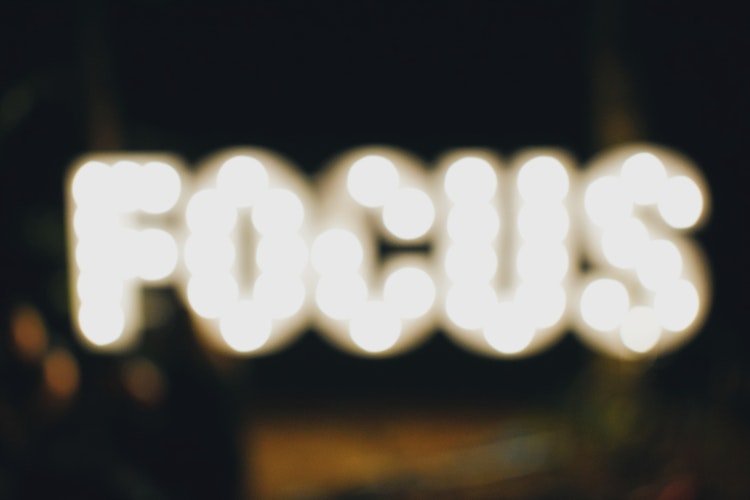
Positive Psychology: Focus is my power. Where I focus is where I will act. It’s very powerful.
Women are running themselves into exhaustion. Do you think that they’re doing it more so than men?
Men do it as well, but what’s happening with women is, we often have multiple roles. We’re not doing business, we’re also a mom. Women give their all in relationship. When relationships are established, men are like, “That’s good. She’s good. I’m going to go do my thing. We’re good. I’m going to give her flowers once a year and we’re good.” That’s not how it works for women. Women invest a lot in that. There’s something with women where the heart space is very important. Connection’s important to men too, but it’s not as high on the list or as high as it is for women. This connection, we work at it. If connection isn’t happening, it’s going to stress us out. We’re trying to work. We’ve got the kids and got these connections and there are multiple connections. Yes, we can absolutely wear ourselves down. I wanted to talk about Dr. Christiane’s book, The Secret Pleasures of Menopause. If you open the book right at the beginning, there’s all the science around a substance called nitric oxide. Nitric oxide gets formed naturally by your body. Nitric oxide is only formed when you’re experiencing pleasure. I’m not talking sexual pleasure, but any kind of pleasure, just feeling good. When you feel good, it’s like this yummy feeling. The body responds and creates nitric oxide. Nitric oxide has been found to be the foundation of well-being in all our systems whether it’s the immune system, the cardiovascular system, and nervous system. Nitric oxide is related to those systems functioning optimally. The absence of nitric oxide starts to degenerate everything.
I know you’re not a science guru in that respect but is this like a reaction to dopamine that we’ve naturally seen as the feel-good hormone?
I don’t know the answer to that, but I would be very curious to know the answer to that. What I do know that was very interesting is nitric oxide must be present for conception to happen. Nitric oxide becomes a vital piece not only to living optimally, but also slowing down the aging process. With the new telomere research, we’ll probably see those two studies starting to come together where you’re going to see nitric oxide impacting the length of telomeres. I don’t know if it’s already been done, but I’d be looking very closely at that study if it does come out. The purpose of this conversation for me is this is what’s important for women who are super busy and want to be successful. What does successful really mean? Because at the end of the day, if we’re completely exhausted, we have no health. We’re disconnected. Is that success? We need to also understand that part of being successful is to live optimally. Part of living optimally is a cultivation of pleasure, of feeling good.
I’ve been doing a little bit of research on the biochemistry behind what we feel and when we’re curious. Dopamine is released, which makes us feel good even though we might fear trying something new. It helps overcome fear, to be curious. It’s a vicious circle sometimes, but it’ll also release some cortisol, which a little bit good but then too much is not good. It’s interesting how many things that we need to look at to stay in a balanced situation where we feel good, but we overdo it.
You have to understand the human system was never designed for this modern life. We come from a completely different history, so our systems have to adapt, and so they are. We’re still biological beings. There’s a very simple process in biology, right down to an amoeba, where beings that are alive will contract away from pain, so there’s a contraction. They’ll also expand and move towards what feels good. There’s a mechanistic. There’s nothing in between that either you feel good and you’re moving towards what’s going to create success and thriving or there’s pain and you’re moving away from the thing, but you’re not creative in that moment. It’s very important lesson. I bring an element, which I call daring because being daring is something missing in our world. We have too much apathy and daring is part of our nature. It’s just unused. If we blend that curiosity and the daring together, we have a very successful combination of leaning in. It might be a little uncomfortable. It’s new but doing it in a way where it could be pleasurable. You’re doing it with friends or you’re trying something different and you’re encouraging yourself. You’re being in that innocence place that children are with new things. You’re building new neural pathways. You’re expanding yourself, and it makes you way more creative to have that.
I’m curious what you think has made us so apathetic?
Part of it is if you look how we’ve commoditized being a human being. We’ve commoditize our sensuality and our sexuality. We’ve commoditized even fulfillment. We hang these carrots in front of everybody. In my book, which is not out yet, I talk a lot about fulfillment. Fulfillment only cares about one thing. In the end, if you feel deeply, what is the felt sense of fulfillment? If you could allow yourself for a moment to take a few breaths and explore what would it feel like in my whole body, the moment of fulfillment, it’s being deeply alive. There’s this sense of aliveness in yourself. You’re like, ” This is awesome.” There’s a satisfaction. There’s aliveness. My logic went, “Fulfillment is and only cares how deeply alive we are moment to moment.”Fulfillment isn’t an end result. Fulfillment is a state of being. We have to look at conditioning because there’s so much conditioning in our world, then we’re not even aware of it because we’re fish in the ocean of conditioning. We don’t know we’re swimming in it, but we must at some point get curious and go, “Am I living my life on my own terms or is the way I’m living being depicted by something external?” The apathy comes from not being engaged in a very creative way with living our life exactly in the way that matters to our own hearts.
[Tweet “Fulfillment isn’t an end result. Fulfillment is a state of being.”]It brings to mind Maslow’s Hierarchy of Self-Actualization. You’re saying, “There’s no real peak to the pyramid. You keep going.”
What I’m saying is that in this moment, we can experience fulfillment if we choose. It’s a shift of perception. Let’s say we have bought into that. Fulfillment will come once I meet A, B, and C. If fulfillment is a felt state and we understand how to self-induce that, if you and I want to drop into a state where we self-induce larger amounts of Oxytocin, which is amazing for health.
How do you do that?
It’s a meditation, like you learn to breathe more deeply and you need to feel your senses. What I want to say about sensuality, sensuality is how human beings make sense of reality, if you think about it. The word has been hijacked by an industry that’s hyper sexualized sensuality. The truth is without seeing, smelling, hearing, and feeling touch, you wouldn’t be able to make sense of where you are. You’d feel very disconnected. You probably feel incredibly lost and disoriented. We need our senses to be even more awake and more aware so that we can start picking up signals long before there were problematic, as a way to keep ourselves safe. In this world, we often numb out thinking that that’s what’s going to keep us safe.
All these things are things that people want to improve. They want to feel safe. They don’t want to be running into exhaustion. You do these workshops seminars and you’ve been around the globe. What are you doing in those workshops and seminars?
The majority of my work and conversations and exercises have nothing to do with it. Healthy sexuality as a result of a healthy human being that feels good about her or himself. I believe that we are erotically intelligent. We don’t need to learn all these things. We need to learn how to become our own best friend and discover who’s this magnificent creature that I am. That’s where the work is mostly focused, to re-invite women to have a direct relationship with their own hearts and what really matters in their lives for themselves and to take a stand for that. If there’s been injury or trauma or wound emotionally or physically or sexually, I believe in using our own body’s physical movement to reprogram trauma. Trauma is held in a very specific way and it’s held both emotionally and physically. When we shift those physical patterns, then the cells change. I’ve seen some miraculous incredible things happen when women take that on and they treat themselves with utmost respect and curiosity.
From all the years I worked in pharmaceuticals, I’ve seen a lot of things that maybe we don’t truly understand. It’s important to focus on that area. Do you only deal with women as far as your workshops or do you have men involved?
I used to teach men when I met my husband. We’re colleagues and we’re like, “Maybe you take the guy part. I’ll take the girl part.”We were both teaching co-ed and we realized at least in the sensuality-sexuality relationship domain, it’s important for men to learn from men and for women to learn from women. We would bring people together once they’ve done their foundational work. We don’t believe in workshopping relationships. We believe that the individual needs to understand their own nature and bring that understanding to their partner, so that we have insights that we can grow together. We prefer to do the fun things with the couples and the homework with the individual.

Positive Psychology: The individual needs to understand their own nature and bring that understanding to their partner.
How can they find out more about your work? If they wanted to attend one of your workshops or read your books or your content, how would they do that?
The most appropriate for the women who may want to be a little more daring or really bring out more confidence and have a contemplation of, “What does matter? Am I living life on my own terms?” Those questions and to be part of a really intelligent, vibrant, global collective of women from all over the world, that’s called The Daring Project. The URL is TheDaringProject.com. It’s a membership group. Nothing “sexual” happens there. It’s more discussions and looking at what’s impacting women instead of having philosophies and theories of something far away. Let’s look at what matters in this moment. That changes week to week. I am very spontaneous with how I deliver the information and it’s based on women showing up and contributing their thoughts.
A lot of people would get a lot out of what you do and that is fascinating. I appreciate you giving me the business perspective, and it was fun to have you on the show.
Thank you so much.
You’re welcome. I want to thank Susan and Saida because they were both really fascinating and they have some great information on their sites. I hope you take some time to look at our guests’ sites. I hope you check out some of the new assessments on our assessment page, and please come back for the next episode of Take The Lead Radio.
About Susan Peppercorn
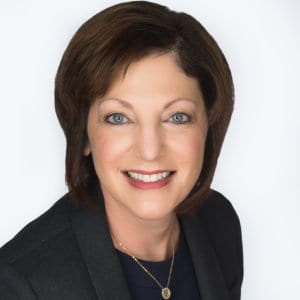 Susan Peppercorn helps mid, and senior-level professionals find their next best career step; promotion, new job, career or entrepreneurial option. She is frequently quoted in the NY Times, and the Wall Street Journal, Fast Company, U.S. News, Harvard Business Review and U.S. World Report are some of the publications that have gone to her for career advice. She is a certified positive psychology coach and was a teaching assistant for Tal Ben Shahar, who taught the most popular course at Harvard University and started the Certification in Positive Psychology. Accredited by the International Coaching Federation, she is an executive mentor for the Boston chapter of the Healthcare Business Women’s Association (HBA). She is the bestselling author of Ditch Your Inner Critic at Work: Evidence-Based Strategies to Thrive in Your Career.
Susan Peppercorn helps mid, and senior-level professionals find their next best career step; promotion, new job, career or entrepreneurial option. She is frequently quoted in the NY Times, and the Wall Street Journal, Fast Company, U.S. News, Harvard Business Review and U.S. World Report are some of the publications that have gone to her for career advice. She is a certified positive psychology coach and was a teaching assistant for Tal Ben Shahar, who taught the most popular course at Harvard University and started the Certification in Positive Psychology. Accredited by the International Coaching Federation, she is an executive mentor for the Boston chapter of the Healthcare Business Women’s Association (HBA). She is the bestselling author of Ditch Your Inner Critic at Work: Evidence-Based Strategies to Thrive in Your Career.
About Dr. Saida Désilets
 Saida Désilets, PhD is a thought-leader, speaker, and researcher regarding how to use our minds, bodies, and spirits to create richer lives. She’s the world leading authority in the Jade Egg practice and founder of the Désilets Method. She is a co-contributor to the best-selling books of Dr. Christiane Northrup and Dr. Rachel Abrams and has led transformational workshops and seminars for around the globe for the past 13 years. She is the author of the Emergence of the Sensual Woman., Susan Peppercorn helps mid, and senior-level professionals find their next best career step; promotion, new job, career or entrepreneurial option. She is frequently quoted in the NY Times, and the Wall Street Journal, Fast Company, U.S. News, Harvard Business Review and U.S. World Report are some of the publications that have gone to her for career advice. She is a certified positive psychology coach and was a teaching assistant for Tal Ben Shahar, who taught the most popular course at Harvard University and started the Certification in Positive Psychology. Accredited by the International Coaching Federation, she is an executive mentor for the Boston chapter of the Healthcare Business Women’s Association (HBA). She is the bestselling author of Ditch Your Inner Critic at Work: Evidence-Based Strategies to Thrive in Your Career.
Saida Désilets, PhD is a thought-leader, speaker, and researcher regarding how to use our minds, bodies, and spirits to create richer lives. She’s the world leading authority in the Jade Egg practice and founder of the Désilets Method. She is a co-contributor to the best-selling books of Dr. Christiane Northrup and Dr. Rachel Abrams and has led transformational workshops and seminars for around the globe for the past 13 years. She is the author of the Emergence of the Sensual Woman., Susan Peppercorn helps mid, and senior-level professionals find their next best career step; promotion, new job, career or entrepreneurial option. She is frequently quoted in the NY Times, and the Wall Street Journal, Fast Company, U.S. News, Harvard Business Review and U.S. World Report are some of the publications that have gone to her for career advice. She is a certified positive psychology coach and was a teaching assistant for Tal Ben Shahar, who taught the most popular course at Harvard University and started the Certification in Positive Psychology. Accredited by the International Coaching Federation, she is an executive mentor for the Boston chapter of the Healthcare Business Women’s Association (HBA). She is the bestselling author of Ditch Your Inner Critic at Work: Evidence-Based Strategies to Thrive in Your Career.
Important Links:
- Susan Peppercorn
- Tal Ben-Shahar
- Ditch Your Inner Critic at Work: Evidence-Based Strategies To Thrive in your Career
- Carol Dweck
- Mindset
- Positive Workplace Partners
- Are You in the Right Job?
- 25 Tips for Making a Successful Career Transition
- @SusanPeppercorn Twitter
- Susan’s Instagram
- Susan’s LinkedIn
- Susan’s Facebook
- Saida Désilets
- Emergence of the Sensual Woman
- Women’s Bodies, Women’s Wisdom
- The Secret Pleasures of Menopause
- The Multi-Orgasmic Woman
- BodyWise
- Genius Network
- TheDaringProject.com

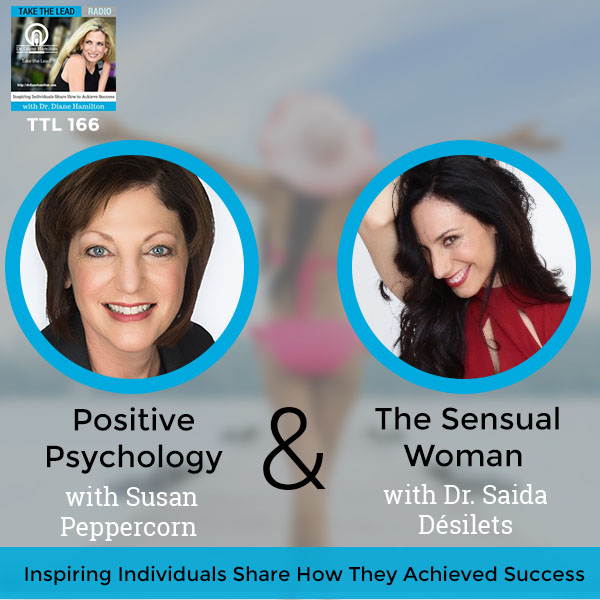

0 Comments